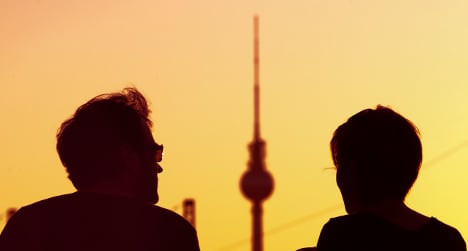There was a time when I enjoyed August in Berlin. Sleepy drinks next to the city’s waterways. The place was comatose but in a positive way, a kind of opium slumber that brings enlightenment in your dreams.
But August is also the month that I was born and it is the time when I become aware that my senses are dulling. I have to wear glasses to read the subtitles of Japanese films; can hardly hear my own voice in a busy crowd. Other senses compensate, of course. Now I can smell much better than when I was 20 – sometimes I feel like the olfactorily gifted murderer in the Patrick Süskind novel “Perfume.” What is my nose telling me at the moment? That Berlin stinks in August.
The U3 from Heidelberger Platz (the station is already famous for its pigeon droppings) to Nollendorfplatz smells of creosote and antiseptic – the aftershave lotion from Hell. Don’t ask me why. The smell of diesel clings to the streets and at a sidewalk café, the chances are that some pungent perfume rises up from the sewers.
To like Berlin in August you have to like the smell of urine: both from cats and humans. It is warm enough for the homeless to sleep outside, so even posh shop fronts smell at 10 am of piss and alcohol. As for the men who change the portable toilets, they have gone on holiday (maybe to the same place as the workers who have set up construction works in every major road). When there is a slight gust of wind, the crap box scent catches the back of your throat like some milder variant of the poison gas used in the First World War (which broke out, of course, in August). Perhaps the city government should impose a tax on public urine, like the Roman Emperor Vespasian once did.
Or perhaps there is just a case for going on holiday in August and abandon the idea that there is something romantic about staying alone in the city accompanied only by the tourists in their flip-flops and ill-fitting shorts. “What dreadful hot weather we have!” writes Jane Austen, the English novelist, “it keeps one in a continual state of inelegance.”
It’s not just the nose that wrinkles; the whole aesthetic apparatus collapses. You notice things in the end-of-summer light that are best left unnoticed. In the apartment, the piles of yellowing newspapers behind the sofa (not to mention the hole in the sofa), the spider web, are suddenly lit-up. The August sun is as unforgiving as neon, stripping away charm. Outside, the trees – you see for the first time – are coated with a thin dust. Birds don’t sing in August, at least not in Berlin.
Whoever said August was supposed to be a benign month? Nagasaki, the Berlin Wall, floods, public transport strikes. It’s the month when nothing is supposed to happen and therefore the perfect moment for bad men to do bad things. Or for the gods to go crazy. It’s the month when you realize that some of the most interesting people in your life have small children and are therefore absent from Berlin, enjoying the fresh air somewhere else. It’s the month when I’m stung by wasps.
Time to surrender, perhaps, and see if there might not be some last minute escape from the city. There is desperation to the mission; like the people trying to clamber onto the last helicopter out of Saigon before the Viet Cong marched in. At a certain moment the August choler defeats dignity and common sense. You reach for the phone and call a travel agent. But the phone rings and rings…and you know, that they too have given up on the city. I remember seeing a sign on the locked door of travel agency simply stating: “Please go away.”
Like migrant birds the travel professionals have a unique sense of timing. August, they know, is a lost cause. If you are still left behind in Berlin in August, there is nothing further that can be done. You are beyond medicine. All you can do is wait for August, the dumb month, to pass and for normal life to resume.



 Please whitelist us to continue reading.
Please whitelist us to continue reading.
Member comments